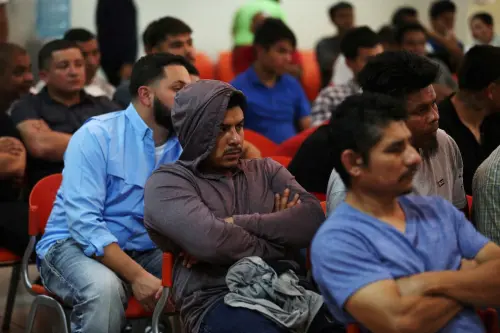Introduction
U.S. President Donald Trump's administration mistakenly deported a Salvadoran man despite a judicial ruling that barred his removal. This incident was highlighted in a court filing on Monday.
Context
Kilmer Abrego-Garcia's lawyers contested the government's claims that he was affiliated with the MS-13 gang and demanded his prompt return to the United States. The government, however, maintained it lacked the legal authority to facilitate his return from El Salvador.
Developments
- On March 15, the Trump administration invoked the 1798 Alien Enemies Act to expedite the deportation of individuals allegedly connected to the Venezuelan gang Tren de Aragua.
- The administration noted that two flights carrying deportees processed under this wartime statute and a third flight with others destined for El Salvador were dispatched on that day.
- In the court filing, a U.S. Immigration and Customs Enforcement (ICE) official stated that Abrego-Garcia was wrongfully included on the third flight despite a 2019 ruling granting him deportation protection.
- "Through administrative error, Abrego-Garcia was removed from the United States," ICE official Robert Cerna detailed in the document. "This was an oversight, and the removal was carried out in good faith based on the existence of a final order of removal and Abrego-Garcia's purported membership in MS-13."
- The Trump administration's actions regarding the deportation of individuals it identifies as violent gang members reflect its broader immigration policies. Advocates for some of the deportees argue they have no gang affiliations and are pursuing active asylum cases in the U.S.
- A federal judge blocked Trump's invocation of the Alien Enemies Act shortly after it was declared, but the administration appealed to the Supreme Court.
- Abrego-Garcia's lawyers indicated on March 28 that no federal criminal or extradition charges had ever been filed against him. They requested that the U.S. District Court in Maryland mandate his return from El Salvador and cease funding for his imprisonment.
- On Monday, the Trump administration reiterated that it did not have the authority to return him as he was no longer in U.S. custody.
U.S. Department of Homeland Security spokesperson Tricia McLaughlin claimed that "intelligence reports" linked Abrego-Garcia to MS-13 and human trafficking but provided no additional details.
Abrego-Garcia's legal complaint noted that his wife and 5-year-old son are U.S. citizens residing in Maryland. According to the complaint, he was detained by ICE officers on March 12 while driving, handcuffed in front of his son, who was in the backseat.
The ICE official mentioned in Monday's filing that the agency was aware of the previous court order prohibiting Abrego-Garcia's removal. Although he was not initially listed on the March 15 flight's manifest, he was later assigned to it as an "alternate" when other individuals were removed for various reasons.
Conclusion
This incident underscores the complexities and legal challenges within U.S. immigration policy, particularly concerning the deportation of individuals with protection status. The legal proceedings surrounding Abrego-Garcia's case continue to evolve, highlighting the ongoing debates over immigration enforcement and humanitarian obligations.
